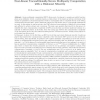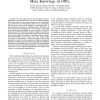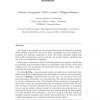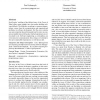316 search results - page 34 / 64 » Where do security policies come from |
IACR
2011
12 years 7 months ago
2011
Secure multiparty computation (MPC) allows a set of n players to compute any public function, given as an arithmetic circuit, on private inputs, so that privacy of the inputs as we...
SEMWEB
2009
Springer
14 years 2 days ago
2009
Springer
Abstract—For many tasks, such as the integration of knowledge bases in the semantic web, one must not only handle the knowledge itself, but also characterizations of this knowled...
TCS
2008
13 years 7 months ago
2008
Our society is increasingly moving towards richer forms of information exchange where mobility of processes and devices plays a prominent role. This tendency has prompted the acad...
ICMCS
2007
IEEE
14 years 1 months ago
2007
IEEE
In this digital era, digital multimedia contents are often transmitted over networks without any protection. This raises serious security concerns since the receivers/subscribers ...
OOPSLA
2010
Springer
13 years 6 months ago
2010
Springer
Fred Brooks’ retelling of the biblical story of the Tower of Babel offers many insights into what makes building software difficult. The difficulty, according to common interp...




